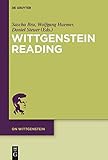Wittgenstein Reading / ed. by Sascha Bru, Daniel Steuer, Wolfgang Huemer.
Material type: TextSeries: On Wittgenstein ; 2Publisher: Berlin ; Boston : De Gruyter, [2013]Copyright date: ©2013Description: 1 online resource (414 p.)Content type:
TextSeries: On Wittgenstein ; 2Publisher: Berlin ; Boston : De Gruyter, [2013]Copyright date: ©2013Description: 1 online resource (414 p.)Content type: - 9783110294620
- 9783110294699
- Literature -- Theory, etc
- Literature -- History and criticism -- Theory, etc
- Philosophy -- History & Surveys -- Modern
- Carroll, Lewis
- Goethe, Johann Wolfgang von
- Literatur
- Philosophie
- Shakespeare, William
- Wittgenstein, Ludwig
- PHILOSOPHY / History & Surveys / Modern
- Carroll, Lewis
- Goethe, Johann Wolfgang von
- Literature
- Philosophy
- Shakespeare, William
- Wittgenstein, Ludwig
- 192 22/ger
- B3376.W564 .W576 2013
- online - DeGruyter
- Issued also in print.
| Item type | Current library | Call number | URL | Status | Notes | Barcode | |
|---|---|---|---|---|---|---|---|
 eBook
eBook
|
Biblioteca "Angelicum" Pont. Univ. S.Tommaso d'Aquino Nuvola online | online - DeGruyter (Browse shelf(Opens below)) | Online access | Not for loan (Accesso limitato) | Accesso per gli utenti autorizzati / Access for authorized users | (dgr)9783110294699 |
Frontmatter -- Table of Contents -- List of Abbreviations -- Introduction -- Being Lost and Finding Home: Philosophy, Confession, Recollection, and Conversion in Augustine’s Confessions and Wittgenstein’s Philosophical Investigations -- The Character of a Name: Wittgenstein’s Remarks on Shakespeare -- To Not Understand, but Not Misunderstand: Wittgenstein on Shakespeare -- Sense and Sententiousness: Wittgenstein, Milton, Shakespeare -- Why the Tractatus, like the Old Testament, is “Nothing but a Book” -- Wittgenstein Lights Lichtenberg’s Candle: Flashlights of Enlightenment in Wittgenstein’s Thought -- Wittgenstein and Goethe: Getting Rid of “Sorge” -- Ludwig Wittgenstein and the Conservative Legacy of Johann Nepomuk Nestroy -- Best Readings: Wittgenstein and Grillparzer -- Wittgenstein’s Reception of Wagner: Language, Music, and Culture -- Ludwig Wittgenstein and Wilhelm Busch: “Humour is not a mood, but a ‘Weltanschauung’” -- Wittgenstein and Dostoevsky -- Wittgenstein Re-Reading -- The Significance of Dostoevsky (and Ludwig Anzengruber) for Wittgenstein -- A Remarkable Fact: Wittgenstein Reading Tolstoy -- Note to Self: Learn to Write Autobiographical Remarks from Wittgenstein -- Wittgenstein Reads Kürnberger -- Trakl’s Tone: Mood and the Distinctive Speech Act of the Demonstrative -- The Chimera of Language? Karl Kraus and Ludwig Wittgenstein -- Well-Versed: Wittgenstein and Leavis Read Empson -- The contributors of the volume -- Index of Names
restricted access online access with authorization star
http://purl.org/coar/access_right/c_16ec
Wittgenstein's thought is reflected in his reading and reception of other authors. Wittgenstein Reading approaches the moment of literature as a vehicle of self-reflection for Wittgenstein. What sounds, on the surface, like criticism (e.g. of Shakespeare) can equally be understood as a simple registration of Wittgenstein's own reaction, hence a piece of self-diagnosis or self-analysis. The book brings a representative sample of authors, from Shakespeare, Goethe, or Dostoyevsky to some that have received far less attention in Wittgenstein scholarship like Kleist, Lessing, or Wilhelm Busch and Johann Nepomuk Nestroy. Furthermore, the volume offers means for the cultural contextualization of Wittgenstein's thoughts. Unique to this book is its internal design. The editors' introduction sets the scene with regards to both biography and theory, while each of the subsequent chapters takes a "ation from Wittgenstein on a particular author as its point of departure for developing a more specific theme relating to the writer in question. This format serves to avoid the well-trodden paths of discussions on the relationship between philosophy and literature, allowing for unconventional observations to be made. Furthermore, the volume offers means for the cultural contextualization of Wittgenstein's thoughts.
Issued also in print.
Mode of access: Internet via World Wide Web.
In English.
Description based on online resource; title from PDF title page (publisher's Web site, viewed 28. Feb 2023)


